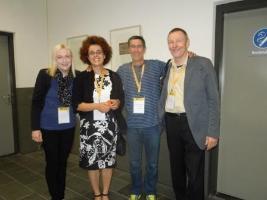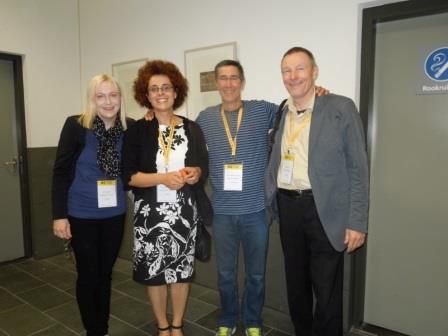
David Lindley, who completed his PhD at ELRC earlier this year, has just returned from attending the 30th EGOS (European Group for Organisational Studies) Colloquium, with the theme of “Reimaging, Rethinking, Reshaping: Organisational Scholarship in Unsettled Times”. The colloquium was held at Rotterdam School of Management, Erasmus University, in The Netherlands, from 2 - 5 July 2014. The paper, which was co-authored by Professor Heila Lotz-Sisitka, captured the essence of his PhD thesis.
his PhD at ELRC earlier this year, has just returned from attending the 30th EGOS (European Group for Organisational Studies) Colloquium, with the theme of “Reimaging, Rethinking, Reshaping: Organisational Scholarship in Unsettled Times”. The colloquium was held at Rotterdam School of Management, Erasmus University, in The Netherlands, from 2 - 5 July 2014. The paper, which was co-authored by Professor Heila Lotz-Sisitka, captured the essence of his PhD thesis.
The colloquium, which included many scholars from around the work not just Europe, was a super experience. It was huge, with over 1 800 people attending, but to make it more manageable, the colloquium was divided into 61 sub-themes, each attended by about 35 participants. The sub-theme, David attended, was titled "Activity Theory and Organisations" which was organized by the famed Yrjo Engeström and Anu Kajamaa from Finland. Engeström is the well known activity theorist who developed the theory of Expansive Learning and later versions of Cultural Historical Activity Theory CHAT ).
).
All those attending the 61 sessions presented at their chosen sub-theme and stayed with all the sessions of the sub-theme throughout the 4 days of the colloquium. This meant that David was able to spend the whole of the colloquium with 35 key people who all presented PhD or Post Doc research based on CHAT and the Theory of Expansive Learning. This opportunity is rare, as not often do 35 people from all parts of the world, who have all used the same theoretical framework to conduct their research, have the opportunity of being together in the same room with the Yrjö Engeström. The quality time that we could spend together sharing our experiences and learning from each other, about our different research journeys, was a truly magical experience. Attending the next EGOS colloquium in Athens in 2015, is highly recommended, for those CHAT and Expansive Learning scholars wanting to immerse themselves in this theoretical research framework, as Yrjö Engeström will again be holding a similar sub-theme session.
and the Theory of Expansive Learning. This opportunity is rare, as not often do 35 people from all parts of the world, who have all used the same theoretical framework to conduct their research, have the opportunity of being together in the same room with the Yrjö Engeström. The quality time that we could spend together sharing our experiences and learning from each other, about our different research journeys, was a truly magical experience. Attending the next EGOS colloquium in Athens in 2015, is highly recommended, for those CHAT and Expansive Learning scholars wanting to immerse themselves in this theoretical research framework, as Yrjö Engeström will again be holding a similar sub-theme session.
Two opportunities exist for publishing David’s paper.
- Firstly Cambridge Scholars Publishing has invited Yrjö Engeström to edit a book based on the papers delivered during our sub-theme, titled "Activity Theory and Organisations", with individual papers edited as book chapters.
- Or secondly, a special edition of Management Learning titled “The social relevance and social impact of knowledge and knowing” will be published in January 2015, and Giuseppe Scaratti, one of the editors present at the sub-theme, asked for submissions, saying that many of the presentations made would justify consideration for publication.
All participants were required to write full length papers, which were submitted prior to the colloquium. All participants were also required to read each other’s presentations before each day’s proceeding started, to maximize the dialogue between participants on each others papers. David’s and Heila’s paper was titled: Expansive social learning, morphogenesis and reflexive action in an organisation responding to wetland degradation. The abstract of the paper follows:
An interventionist research project was conducted to explore the factors inhibiting improved wetland management within a corporate plantation forestry context, and determine if and how expansive social learning processes could strengthen organisational learning and development to overcome these factors. The study was supported by an epistemological framework of cultural historical activity theory and expansive learning. Realist social theory and its methodological compliment the morphogenetic framework gave the research the depth of detail required to explain how the expansive learning, organisational social change, and boundary crossings that are necessary for assembling the collective were taking place. Critical realism provided ontological depth to the research. The research found that expansive social learning processes supported organisational learning and development for improved wetland management by: 1) strengthening the scope, depth, and sophistication of participant understanding; 2) expanding the ways staff interact and collaboratively work together; 3) democratising decision making; 4) improving social relations between staff, reducing power differentials, and creating stronger relationships; 5) enhancing participant reflexivity through deeper understanding of social structures and cultural systems, and changing them to support improved wetland and environmental practice of staff, and developing the organisational structures and processes to strengthen organisational learning and development. Five types of changes emerged from the research: 1) changes in structure, 2) changes in practice, 3) changes in approach, 4) changes in discourse, and 5) changes in knowledge, values, and thinking. These changes ranged on a visibility scale from being quite explicit on the one hand, to being more tacit on the other. The study was able to explain how the changes occurred via the interaction of structural emergent properties and powers; cultural emergent properties and powers; and personal emergent properties and powers of agents. It was concluded that expansive social learning can provide an environmental education platform to proactively work with the sociological potential of morphogenesis to bring about future change via an open-ended anticipatory and reflexive expansive learning process.
emergent properties and powers of agents. It was concluded that expansive social learning can provide an environmental education platform to proactively work with the sociological potential of morphogenesis to bring about future change via an open-ended anticipatory and reflexive expansive learning process.
David’s trip was kindly sponsored by Heila Lotz Sisitka and the Rhodes University Student Travel and Subsistance Grant.

Here are some of the big names in Activity Theory, all based at the CRADEL Centre at the University of Helsinki: Anu Kajama, Annalisa Saninno, David Lindley (from the ELRC) and the famed Yrjo Engeström. Nice to be able to put names to faces, at last, and all are really fun people too.
Theory, all based at the CRADEL Centre at the University of Helsinki: Anu Kajama, Annalisa Saninno, David Lindley (from the ELRC) and the famed Yrjo Engeström. Nice to be able to put names to faces, at last, and all are really fun people too.
